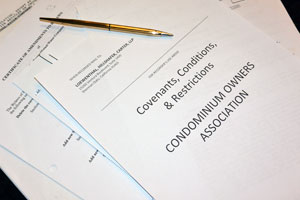LHC Newsletter Vol 9, No. 2
“A REVIEW OF 2016 CALIFORNIA COURT DECISIONS AFFECTING COMMUNITY AND HOMEOWNER’S ASSOCIATIONS”
By: Robert D. Hillshafer
David A. Loewenthal
Barbara A. Higgins
1. Nellie Gail Ranch Owners Association v. McMullin 2016 S.O.S. 5455[*]
(A Quiet Title and Equitable Easement Case in favor of the Association)
Significance: This case is a victory for HOAs seeking to regain control over their common area encroached upon by homeowners as it clarifies the application of the legal doctrine of adverse possession and prescriptive easements to common areas.
Brief Facts: Plaintiff Nellie Gail HOA sued the McMullins, (Defendants), for quiet title and to compel the McMullins to remove a retaining wall and other improvements they built without HOA approval on more than 6000 square feet of common area that the HOA owned adjacent to the McMullins’ property. After a bench trial, the trial court entered judgment for the HOA and awarded them their attorneys’ fees. The McMullins appealed, claiming the trial court should have awarded them quiet title, or at least should have granted them an equitable easement over the disputed property based on communications from the Association.
Disposition: The Court of Appeal affirmed the trial court’s judgment in favor of the HOA.
Key Findings: The Court noted that the essential elements for equitable estoppel were lacking in the evidence.
Defendants based their equitable estoppel claim on the two written communications they received from the HOA Board of Directors telling them they had decided not to pursue the unauthorized construction of the retaining wall and related improvements as a CC&Rs violation, but instead instructed them to work with the Nellie Gail’s architect to develop a landscaping plan to screen the wall from view. In reliance, thereon, the McMullins assert they spent $20,000 on a landscaping plan for the area around the retaining wall.
The Court was not sympathetic, finding that the McMullins could not have justifiably relied on the written communications from the Board of Directors since the communications occurred well after the McMullins spent $150,000 to construct the wall and improvements, and that amount did not include landscape screening, irrigation, and drainage around the wall. Moreover, the Court concluded that the HOA did not know all the essential facts regarding the extent of the encroachment when it voted not to pursue the wall as a CC&Rs violation and approved the plans to screen the wall in an effort to reach an amicable solution. The Court also found that the McMullins were not ignorant of the facts because they concealed their rear property line’s location from the HOA and knowingly started construction without written approval from the HOA.
(2) The Court of Appeal also disagreed that the McMullins acquired any interest in the disputed property by Adverse Possession (“AP”). The Court concluded that the Defendants did not meet their burden of proving that they either paid taxes on the property at issue, or that no taxes were levied or assessed. Instead, they argued the common area had no value, so there was no taxation. Payment of taxes over a five-year period (or a showing that no taxes were levied or owed) is one required element for AP. It was noted that common areas like the one at issue do have value and the property taxes for it are levied and paid by the individual homeowners of an association.
(3) The trial court’s grant of an injunction against the McMullin’s encroachment (requiring them to remove the visible portions of the retaining wall and restoring the surrounding area) was confirmed on appeal as not being an abuse of discretion. To do otherwise, would have resulted in an equitable easement for which three factors had to be present. First, the defendant must be innocent, meaning the encroachment must not be willful or negligent. In this case, the Court of Appeal did not even have to consider the second and third factors involving injury and hardship to the parties, because the McMullins were found to be not innocent in constructing the wall on HOA property, and intentionally did not identify their rear property line even though they were asked to supply that information in their applications, and they knew that their previous plans for the retaining wall had been rejected in writing before they constructed it.
- Palm Springs Villas II Homeowners Association, Inc. v. Parth(2016) 248 Cal.App.4th 268
(A Board of Director’s Breach of Fiduciary Duty and CCRs Summary Judgment Case – an important test for the Business Judgment Rule)
Significance: This case is important because it tells us there is no automatic immunity, presumption of innocence, or deference granted whenever an officer or member of a Board of Directors acts or believes he or she is acting in good faith, but is actually mistaken in the actions taken, or decisions made because the officer or Board member did not properly investigate or follow the rules in the Association’s governing documents. In addition to acting in good faith, the individual must exercise “reasonable diligence” by following the governing documents, including CC&Rs and By-Laws, (especially with regard to member or voting approval, and the subject matter at issue), and investigating contractors, and any other contractual (or other) issues before binding the Association. This decision could have significant impact on defenses asserted by members of a Board, as well as on Association D & O insurance issues since the Business Judgment Rule is a prime avenue of defense.
Brief Facts: A condominium homeowners’ association sued an individual, 87-year-old former Board Member and President of the Board (“Defendant”) for breach of fiduciary duty and breach of the Association’s governing documents. At the request of the Association’s property management company, the Defendant, who was President at the time, went to the management office and signed multiple construction contracts allegedly without investigation of contractor licenses and without Board approval or a vote. The HOA was later sued by one contractor for breach of contract when they terminated his services early. Over a four-year period, the Defendant also signed at least two large promissory notes secured by Association assets to fund common area paving and walkway projects, and a 5-year landscaping contract extension, with some Board resolution and authorization to do so. However, the Bylaws required member approval for both. Defendant President also found and hired a roofing company on her own (without initial notice or approval by the Board) after the members voted against a special assessment to offset repairs for an estimate submitted by another roofer. Issues later arose about the licensing and [poor] quality of the roofer’s work. Defendant also renewed a one-year security company contract without a Board vote and approval, while one Board member was actively obtaining bids from other companies. Defendant testified she acted in good faith, in the best interests of the Association, and did not receive any pecuniary gain or personal benefit.
Disposition: The Court of Appeal reversed the summary judgment granted in Defendant’s favor under the Business Judgment Rule. The Court concluded there were genuine issues of material fact as to whether Defendant breached the governing documents, whether she exercised reasonable diligence in investigating and paying the contractors, and whether she acted in good faith. The Court also found that genuine issues of material fact existed as to whether the exculpatory clause in the CC&Rs or the Business Judgment Rule applied at the summary judgment stage.
Key Findings: The Court agreed with the Association, finding that summary
judgment could not be granted in Defendant’s favor on the basis of the Business Judgment Rule or the exculpatory clause because the record disclosed triable issues of fact that should not have been resolved without a trial.
- Almanor Lakeside Villas Owners Association v. Carson(2016) 246 Cal.App. 4th 761
(HOA awarded larger attorneys’ fees than the amount of fines it requested.)
Significance: Although most of the Association’s $54,000 fines were disallowed, it was awarded more than $100,000 in attorneys’ fees as the prevailing party, making it the overall winner in the case. The Court recognized that the Association had the right to adopt and enforce its own reasonable rules, and that some of the fines/fees charged were justified.
Brief Facts: Homeowners’ Association brought action against unit owners of two properties, seeking to enforce fines and CC&R provisions which were intended to prevent owners from using their properties for rentals less than thirty (30) days in duration, or for hotel purposes, unless the owners provided the board with the rental agreement at least seven days before the rental period.
Disposition: The Court of Appeal affirmed the award of attorneys’ fees and the judgment on the owners’ Cross-Complaint in favor of the Association, and awarded them costs on appeal.
Key Findings: Although both sides claimed to be the “prevailing party”, the Court awarded attorneys’ fees to the Association under CCP Section 5975 of the Davis-Stirling Act, deeming it to be the prevailing party in an action to enforce the governing documents. Since the statute and Act do not define “prevailing party”, the test to make that determination is “whether a party prevailed on a practical level by achieving its main litigation objectives.” Even though both sides achieved some positive net effect (and had mixed results), the Court concluded that since some of the fines were enforceable, the Association had met its objective and satisfied the criteria needed “to enforce the governing documents”. Therefore, there was no abuse of discretion in determining the HOA was the prevailing party.
- Rancho Mirage Country Club Homeowners Association v. Hazelbaker
(2016) 2 Cal.App.5th 252
[Favorable case for Associations granting them attorneys’ fees for enforcing a settlement – lawsuit treated as action “to enforce the governing documents”]
Significance: The Association as the party who prevailed by “achiev[ing] its main litigation objectives” was entitled to its reasonable attorneys’ fees in a patio dispute which the Court treated as an action to enforce the governing documents, rather than simply as a breach of a settlement agreement, which would have required applying a different standard.
Brief Facts: Homeowners made improvements to exterior patio which the Association contended violated the governing CC&Rs. The parties mediated the dispute pursuant to the Davis-Stirling Act which resulted in a written agreement. Subsequently, the Association filed this lawsuit, alleging that the Defendants had failed to comply with their obligations under the mediation agreement to modify the patio in certain ways. The homeowners made changes to the patio to the Association’s satisfaction during the ongoing lawsuit, but the parties could not come to agreement on the subject of attorneys’ fees. The Association believed it was the prevailing party entitled to its fees.
Disposition: The Court of Appeal held that the Association was the prevailing party and that the lawsuit was an action “to enforce the governing documents” within the meaning of the Davis-Stirling Act, entitling the Association to its reasonable attorneys’ fees for the lawsuit and on appeal.
Key Findings: Since the focus of the Association’s complaint was that the homeowners had not taken certain steps to bring their property into compliance with the applicable CC&Rs, the relief sought is an order requiring defendants to take those steps. The fact that there was a mediation agreement signed to make them comply does not change the underlying nature of the dispute or relief sought. The trial court properly considered the Davis-Stirling Act as the basis for recovery, which provides for mandatory attorneys’ fees to the prevailing party. The Association prevailed because they achieved their goal by compelling the Defendants to complete the modifications to the patio.
FEDERAL CASE LAW – PUBLISHED
- Castillo Condominium Association v. U.S. Department of Housing & Development
(2016) 821 F.3d 92
[HUD prevailed in case in which condo association was found to have discriminated against a homeowner by not letting him keep his pet as an emotional support dog.]
Significance: HUD views this FHA discrimination case as a victory for people with disabilities, one that allows them to have reasonable accommodations when proven to be needed, and one which prohibits discrimination based on disability. HOA’s will need to make exceptions to “no pets” policies if the facts of the case warrant it. Here, the homeowner had a lifelong history of depression and treating doctors for years had corroborated his account that he suffered from a mental impairment that “substantially limited one or more of his major life activities.”
Brief Summary: The Appeals Court confirmed this year a decision made by HUD in 2014 in which it ruled that a condo association violated the rights of a homeowner with disabilities (anxiety and depression) when it refused to allow the homeowner to keep his “emotional support dog” as a reasonable accommodation to its “no pets” policy. The homeowner had been warned by letter that he would be fined if he kept the dog, and he responded promptly in writing, including a note from his treating psychiatrist, informing the HOA of his disability and need for the dog. It made no difference to the Association and HUD determined that the homeowner was forced to sell his condo and find alternative housing. The Association appealed after being found liable for $20,000 in damages to the homeowner, along with a $16,000 penalty.
- Desert Pine Villas Homeowners Association v. Kabiling
In re Kabiling (551 B.R. 440)
[Association held in contempt for violating a Bankruptcy Court discharge order]
Significance: Homeowner Associations need to consult with qualified attorneys to assist them in determining what course of action to take, if any, once a homeowner files for bankruptcy. The Association may have had a different result if it did not seek attorneys’ fees, or make allegations about pre-bankruptcy debts, and/or had specified that it was not seeking any money from the former owners.
Brief Summary: After homeowners filed a Chapter 7 bankruptcy petition and abandoned their unit, the Association acquired it through a nonjudicial foreclosure sale. However, the homeowners were discharged from their outstanding Association debt upon filing for bankruptcy, and the court ordered all creditors to cease attempting to collect any discharged debts from them. The discharge order was mailed to all creditors, including the Association. Notwithstanding, the Association sued the homeowners in an effort to confirm that it held good title to the unit (in order to obtain title insurance), and to demand its attorneys’ fees. This was not well received by the Court, which responded by holding the Association in contempt for violating the Court’s discharge order when it sued the homeowners for failure to pay assessments, clear title, and sought its attorneys’ fees from the discharged homeowners, all of which were based on pre-discharge events. The Association was ordered to pay the homeowners $8,928 in damages for their contempt of the Court’s order.


